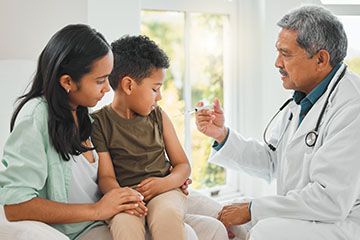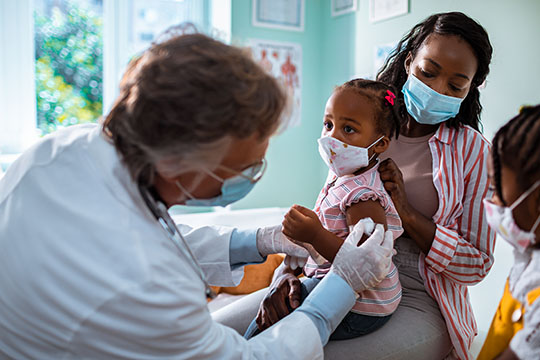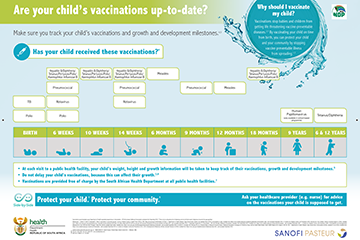Immunisation
| Description: |
Immunisation/vaccination protects adults and children from dangerous diseases by working with your body’s natural defences to build protection. Vaccines also help prevent and control infectious disease outbreaks. If enough people get vaccinated, then the people who are vaccinated protect people who can’t be vaccinated from a disease for medical reasons. What is immunisation? Vaccines are special medications that can prevent very serious, sometimes even deadly, illnesses. They work by teaching your body to protect itself when it is infected by these illnesses. The use of vaccines has seen a decrease in childhood deaths caused by these infections, in some cases, certain diseases no longer exist because of vaccinations. Vaccines stimulate the immune system to produce antibodies- special proteins in your body fighting infections. However, unlike bacteria and viruses, vaccines do not cause the person to become ill to develop these antibodies. The Department of Health and Wellness strongly advises mothers to vaccinate their children to protect them from infectious diseases by getting them vaccinated between birth and 12 years old. The Department also runs immunisation campaigns, and health workers are sent to nursery schools and crèches to immunise the children where capacity allows. Immunisations are safe. Although side effects following immunisations may occur, they are usually mild and clear up quickly. Contact your clinic for advice if you are concerned. WATCH: Immunisation saves lives What do childhood vaccines prevent? Polio: Caused by germs (polioviruses), which attack nerves, causing weakness or paralysis of the leg and/or arm, and if severe, may involve respiratory or breathing muscles. Measles: Cause high fever and a rash and can lead to diarrhoea and dehydration, deafness, eye complications, pneumonia, brain damage and even death. Haemophilus Influenza Type B (Hib): Is an illness that affects children under the age of 5 years, and death from Hib disease is common in children under the age of 1. Hepatitis B: It is an infection of the liver that can cause liver damage, liver cancer and death later in life. Pertussis (whooping cough): It starts with a headache, fever and cough. The strenuous coughing bouts make it hard for a child to eat, drink or even breathe. Tetanus (lockjaw): It occurs when a toxin produced by a tetanus germ from the soil enters a cut or wound. The toxin can cause muscle spasms, breathing and heart problems, and death. The chances of dying from this condition are very high. Diphtheria: It is a dangerous bacterial disease which makes it difficult to breathe. Children who survive diphtheria disease suffer permanent damage such as blindness, deafness and brain damage. Tuberculosis (TB): It is a disease that can affect people of all ages. Those that get TB suffer from coughing for a long time, chest pain, sweating at night, weight loss and even death if left untreated. In young children, the TB germ may infect the brain and cause meningitis, or it could also enter the blood and spread to other parts of the body. TB can kill young people. The best protection for young children against opportunistic diseases caused by the TB germ is the BCG vaccine. Usually, babies not given the BCG vaccine at birth will be immunised when they are taken to the clinic for the next immunisation visit at 6 weeks of age. Any baby under 1 year who did not get the BCG vaccine at birth must be taken to the nearest clinic, where they will receive the vaccine. The Department also vaccinates against Rotavirus (one of the viruses that cause diarrhoea) and Pneumococcal disease (e.g. meningitis, otitis media, pneumonia, bacteraemia). Which symptoms do children display after getting vaccinated? You can discuss with the Health Care Worker when What happens when a child is late with getting their vaccinations? It’s never too late to vaccinate. You can discuss this with the Health Care Worker at the clinic. Catch-up is different for the various vaccines. What happens if you lose the Road to Health book? You can discuss this with the Health Care Worker. It’ll depend on the age of the child. If the child is eligible, a copy of the Road to Health Booklet may be issued, and information in the book updated as deemed necessary. When children go for their immunisations, what other things do they assess? Besides growth assessments such as weight, head circumference and height, they might do the following:
What to bring along when getting your child(ren) vaccinated? The clinic will open a folder when it’s your first visit to the clinic. You will need your ID, the birth certificate of your child, and the Road to Health Booklet (RTHB). You only need the RTHB for follow-up visits. What do you need to do post-immunisation? Discuss with the Health Care Worker. Do NOT apply ointment/Vicks to the vaccination site. COVID vaccine and children? Currently, children over 12 years are eligible for the COVID vaccine. When the school administers the vaccine, consent forms need to be completed by parents or caregivers. The COVID vaccine is different from the routine childhood vaccines. Visit the COVID vaccine website for vaccine information. When must children be vaccinated? You can download the complete periodic programme for immunisations below. Hints and tips before you take your little one to get vaccinated
|
| Instructions: |
For more information on immunisation, contact your local clinic or the South African Vaccination and Immunisation Centre (SAVIC)
|
| Provided At: |
These facility categories: |
| Government Body: | (Western Cape Government) |
| Price: |
All the vaccines in the routine schedule are free of charge at all primary health care facilities and centres. |
- Child Developmental Screening and Growth Monitoring (Service)
- Integrated Management of Childhood Illnesses (IMCI) (Service)
- Intradermal BCG Immunisation (Public Information) (File type: pdf; size: 278.11 KB)
- Measles - Fact Sheet (Public Information) (File type: pdf; size: 171.59 KB)

 Immunisation saves millions of lives every year. It will protect you, your children and the community from dangerous diseases.
Immunisation saves millions of lives every year. It will protect you, your children and the community from dangerous diseases. the child attends for vaccination. If the Health Care Worker administers an attenuated (weakened, live virus) vaccine, the child may develop mild symptoms of such a disease (e.g. fever and diarrhoea following the Rotavirus vaccine).
the child attends for vaccination. If the Health Care Worker administers an attenuated (weakened, live virus) vaccine, the child may develop mild symptoms of such a disease (e.g. fever and diarrhoea following the Rotavirus vaccine).

